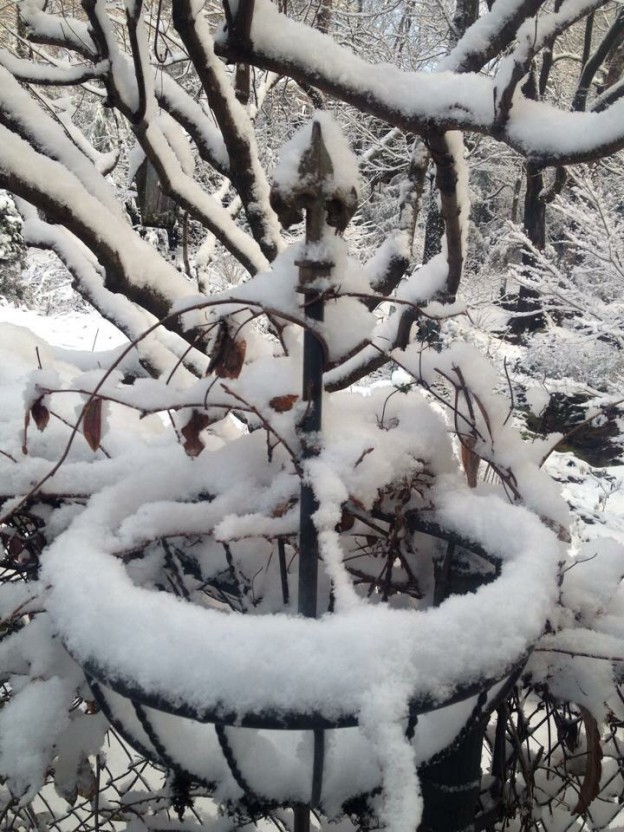The horticulture business is framed out of necessity by the weather and the vagaries of nature… heat, cold, storms, wind, drought. When Billy Angell built Oak Street Garden Shop’s first shade house early in 1990 and finished the greenhouse at the end of that year, he knew that, even with these protections for the plants, the weather would always be a factor in whether a year was exceptional or just average.
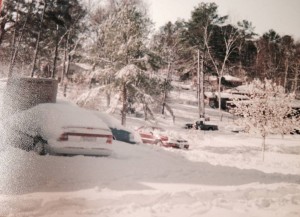
The day after…
No one in horticulture ignores weather reports, and Billy was certainly no different. It’s a typical pattern: Rainy days are usually slow days, and a string of great weather makes any nurseryman smile. Snow in the south is definitely a recipe for a bad greenhouse day or, more likely, multiple days. I know many of you remember Birmingham’s historic blizzard of March 12, 1993, and have your stories to tell. Here is Oak Street Garden Shop’s:
The local and national weathermen had been analyzing the forecast carefully for days, and, by all accounts, the conditions were ripe for a possible historic snow event. But how much? Just a week earlier multiple spring shipments had rolled in on large trucks, been unloaded, priced, and set out in the nursery. And, though this was only the third year of his fledgling start-up, Oak Street Garden Shop, Billy Angell had been in the nursery business for many years previous and knew this weather forecast had the potential to spell big trouble.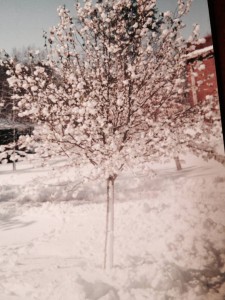
Looking at the plant material, he saw with his practiced eye many shrubs with buds or open blooms just arrived from the warmer gulf coast, tropical blooming plants of plumbago, beautiful yellow “daisy trees” (euryops) from the west coast, and many, many more with tender new growth that would easily sustain foliage damage in temperatures near freezing, let alone below.
This was a constant worry each late winter/early spring. Shipments of plants arrived, and, inevitably, the Alabama winter temperatures would plummet. We’d shift pots close together and cover them with poly and frost cloth, moving other even more tender tropicals into the warmth of the greenhouse. This moving, covering, uncovering, and endless shifting would become a routine rhythm of early spring not only this year but each of the many years that followed.
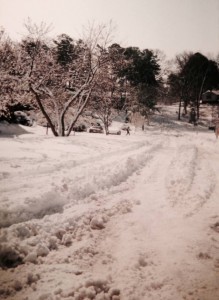
An impassable road on the day after…
The morning of Friday, March 12th, I came in to work, expecting to begin the process of covering the many plants in the nursery and moving some inside. Billy had been watching the forecast, though, and told his small staff the decision he’d come to the night before. “I think we need to move everything in,” he said soberly.
“So you’ve changed your mind about covering?”, I asked. “I’ve been going round and round about it,”, he answered. “But, if the totals they’re predicting come true, I’d rather have everything in the greenhouse than have the weight of that much snow collapse the poly over them.”
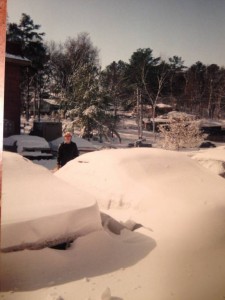
I think that was my car…
We all looked at each other. If we were going to be taking everything in, we needed to get to work, as it was going to take non-stop moving to get it done before the day was through. Billy had worked out a plan the night before between watching weather forecasts. The largest trees and shrubs would be moved first, loaded onto carts if they weren’t too large, walked in one by one if they were.
Back and forth, in and out we went, lining the large pots in straight lines and right up against each other, tight. There’d certainly be no getting to plants once they were in place. Starting on the far left side right up against the wall of the cool cell, slowly but steadily filling in and moving toward the middle and finally to the very opposite end of the greenhouse, it was becoming a solid patchwork of greens, yellows, pinks, blues. It seemed as though all the colors of spring were being safeguarded from the coming weather.
By that afternoon, finally finished, we looked over the sea of plants. Numbering in the hundreds, trees, tropicals, shrubs, perennials, herbs, and tender annuals, all side by side from one end of the greenhouse to the other with not an inch to spare between.
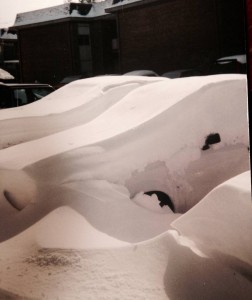 Exhausted, we went next door to have a drink and relax a bit before heading to our respective homes and families. Relieved we were through and enjoying a few laughs, we all suddenly noticed how heavily the large flakes were falling and began saying our goodbyes, heading out into the rapidly falling snow.
Exhausted, we went next door to have a drink and relax a bit before heading to our respective homes and families. Relieved we were through and enjoying a few laughs, we all suddenly noticed how heavily the large flakes were falling and began saying our goodbyes, heading out into the rapidly falling snow.
By the time this historic snow storm was over, the totals were over 12″ in our southern city and thousands of people were without power. We all knew then that no one would forget where they were and what they were doing leading up to and through the Blizzard of ’93.
The next day Billy trekked through the foot-deep snow the mile from his house to Oak Street Garden Shop, relieved to see that the greenhouse had withstood the weight of the heavy, wet snow. And, though the generator refused to start to power the large heaters, the fact there were hundreds of plants packed so tightly together served to provide just enough protection from the cold to keep them from freezing, and, amazingly, only a very few were lost.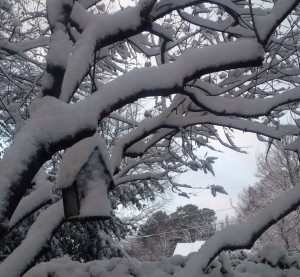
So the weather, bad as it was, had not won this round since his nurseryman’s decision had been the right one. Less than a month later (after having moved every plant back to its proper place, then repeatedly covering and uncovering, moving others in and out and back again as temperatures still dipped down, then back up in the normal rhythm), we finally enjoyed the full and exuberant throes of spring, and the Blizzard of ’93 slowly and easily slid into distant memory.
This is the second post in a series celebrating Oak Street Garden Shop’s 30th year in business. For the first, highlighting Oak Street Garden Shop’s beginnings, take a look HERE.
Posted by Kris Blevons

